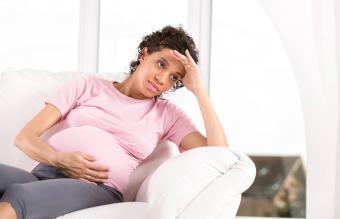
While most people have heard of postpartum depression, many don't realize that pregnancy and depression can also go hand in hand. If you're pregnant and feeling depressed, you aren't alone. Many women who already have depression before they conceive will continue to struggle with symptoms during pregnancy, and some women may experience their first bout of depression during this period of significant life change.
Depression Before Conception
Depression is a disorder that can affect one in four women during their lifetime, regardless of age or motherhood. It's only natural that women with depression will want to conceive children just as much as their non-depressed counterparts. However, trying to conceive while suffering from depression may add some challenges to the process of getting pregnant.
Medication Issues
The Mayo Clinic recommends that women who want to get pregnant and are on medication for their depression take the lowest effective dose of their drug. Your prescribing physician can work with you to find the lowest dose that works; it may take a little time to find this but a lower dose may be safer for your unborn child. You should always consult a physician before changing your medications.
Managing Stress and Moods
As with any woman trying to conceive, it is important to limit stress. Be prepared for mood swings, as you go through the process of conception. You may be less motivated to have intercourse during certain periods, and that is okay. Don't put stress on yourself about feeling depressed, because this can actually hinder conception.
Depression During Pregnancy
It's estimated that at least 10% of pregnant women will experience depression during their pregnancy. The rapid changes in hormone levels during the beginning of pregnancy can cause changes in the brain and lead to depression to some women - even in women who have not had depression before. Stressful situations, previous problems with other pregnancies, relationship issues, and a history of abuse can all trigger signs of depression in women during pregnancy.
Symptoms
Noticing the signs of depression in these women is important. Pregnant women may experience some of the following symptoms of depression for at least two weeks:
- Difficulty concentrating
- Constant sadness
- Sleeping too much or too little
- Loss of interest in previous activities
- Thoughts about suicide or death
- Change in eating habits
- Anxiety
- Guilt
What to Do if You're Concerned
Unfortunately, many pregnant women with depression may not be accurately diagnosed because symptoms may be attributed to typical pregnancy issues and hormonal changes. Lack of a diagnosis can be dangerous for both mother and baby. Depression and anxiety may be associated with preterm labor; untreated depression can also interfere with the ability to appropriately care for yourself or the developing baby.
It's always important to talk to your doctor if you are worried about your mood. If you have periods of extreme sadness or thoughts about harming yourself, contact a medical professional right away. You can also contact someone from the National Suicide Prevention Lifeline.
Medication for Depression During Pregnancy
If at all possible, unneeded medication should be avoided during pregnancy. For some mothers, however, the risk of depression's effects on the mother and fetus, as well as the chance of postpartum depression, dictate that they should be placed on medication.
There are some antidepressants that are safer during pregnancy than others, so be sure to tell any doctor or psychiatrist who is prescribing you medications that you are pregnant. If you need to find out about a drug you may have been prescribed or are presently taking, you can research them online. Long-term effects of these medications may not be known as well; it is important to discuss your care and any concerns with your health care provider.
Never stop or start taking a medication without first discussing it with your doctor.
Therapy and Support Groups
For many women, therapy is a very effective method of dealing with depression. Social workers, psychologists, or psychiatrists can work with the expectant mother and allow the woman to discuss how she feels during this crucial time in her life. Your medical doctor or midwife can help you find a qualified therapist in your area, or you can contact your health insurance company for a referral.
Some doctors feel that a support group for depressed moms-to-be can help. Many online forums such as those at The Bump and Babycenter offer expectant moms a way to communicate with other pregnant women in their condition. Women can also find local support groups through their health care providers or in the phone book.
Other Treatments
Although there are many alternative treatments for depression, it's important to note that herbal therapies are not recommended during pregnancy because these supplements have not been rigorously tested in pregnant mothers.
However, regular exercise can be beneficial for pregnant women with depression. Light therapy may also be helpful in these women as noted in a small study; in this report, treatment with bright white light improved depression symptoms.
Managing Depression in Pregnancy
While depression in pregnancy can be a challenging condition, it is important to remember that you and your doctor can manage the condition so you can have a healthy and happy pregnancy. It may take some trial-and-error to find the best therapies that work for you, but your doctor is there to help.







